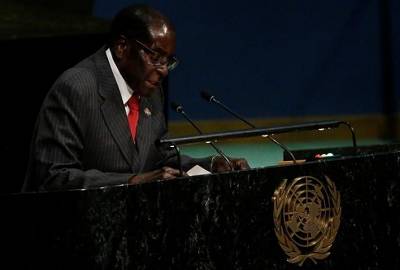As a noon deadline for President Robert Mugabe to resign nears, as imposed by Zimbabwe's ruling party, people remain in a state of shock after the 93-year-old leader refused to bow to pressure and quit.
Public expectation was high that Mugabe, under incredible pressure to quit, would tender his resignation in a live address to the nation on Sunday evening. But after 37 years in power, Mugabe held to his throne longer.
In a scenario that last week would have been unthinkable, tens of thousands of citizens and his ruling ZANU-PF party have turned against Mugabe after a military takeover on November 15 - which put the president under house arrest.
The ZANU-PF party's Central Committee, after expelling Mugabe as its leader on Sunday, has given him a Monday noon ultimatum to step down as president, or face impeachment.
Instead of celebration, the streets of Harare, the capital, were quiet after Mugabe's address, in which he only acknowledged the party's problems. He took note of the military action, but said it did not challenge his authority as head of state.
"The operation I alluded to did not amount to a threat to our well-cherished constitutional order," Mugabe said. "Nor was it a challenge to my authority as head of state and government. Not even as commander-in-chief of the Zimbabwe Defense Forces."
Mugabe vowed to preside over the extraordinary congress scheduled for next month.
"The party congress is due in a few weeks and I will preside over its processes," said Mugabe.
He ended his address with a wartime mantra: iwe neni tine basa- "you and I have a job to do".
On Monday morning, Chris Mutsvangwa, the head of the Zimbabwe National Liberation War Veterans Association, renewed a plea for Mugabe to resign and threatened further protests.
Speaking in Harare, he said: "Mugabe, go now, go now ... your time is up!"
He added: "Please leave State House and let the country start on a new page."
War veterans, who fought alongside Mugabe during the 1970s struggle for liberation from Britain and spearheaded the repossession of white-owned commercial farms in the 2000s, claim their president has betrayed the revolution.
Zimbabweans watching the speech at a cafe in the capital gasped in disappointment and disbelief.
Those who had gathered in bars and restaurants expressed disappointment and anxiety.
Tears welled up in Augustine Moyo's eyes.
"I'm disappointed and heartbroken. I came all the way to see him resign, but now he's buying time. He bought time for another day, but he can't buy time for another election," the 35-year-old public relations officer told Al Jazeera.
"We've managed to survive to a non-coup for the past few days, but we are now in danger of things escalating. The military can't afford to back down now and he's not resigning so we now have a stalemate, but something will have to give and it won't be the army."
Gabriel Muchenagumbo, 30, told Al Jazeera he was unsurprised.
If the president did not submit his notice by midday on Monday, he feared the further measures that could be taken to remove him.
"To me, he's already gone, these are the last kicks of a dying horse and if he doesn't submit that letter then measures will be taken against him by the parliament and the army," the barber said. "He will have to be pushed out, but we cannot be sacrificed for one man, we can't."
According to the constitution's rules on stepping down, the president is required to submit a written letter of resignation to the Speaker of Parliament who must then issue a public notice within 24 hours of receipt.
In the event Mugabe does not file his notice, Chris Mutsvangwa, leader of the war veterans, has warned impeachment proceedings against him will begin.
A motion could be put forward when parliament sits on Tuesday.
However, analyst McDonald Lewanika told Al Jazeera the process may take a few days as the house has to investigate the grounds for impeachment before pronouncing a decision on the motion.
In an unprecedented mass protest, hundreds of thousands of Zimbabweans took to the streets on Saturday to demand an end to Mugabe's rule.
Valerie Mjanji, 37, a manager who participated in the march, said Mugabe needed to see an even stronger message from the people.
"He's danced his dance but now it's time to let it go, he's had his time as president, but now he needs to let the nation go and let us be free," she told Al Jazeera. "If we have to come out in our numbers then we should do that because he needs to get it, it's time to let go."
Morgan Tsvangirai, the leader of the country's largest opposition party, the Movement for Democratic Change, reportedly said he was "baffled" by Mugabe's resistance.
The Central Committee also voted to reinstate as ZANU-PF's second secretary and interim party president Emmerson Mnangagwa - the vice president who Mugabe sacked on November 6. The Central Committee's decision is expected to be ratified at next month's congress.
Regional dignitaries from the Southern African Development Community (SADC) are expected to hold an extraordinary session this week to discuss the Zimbabwe situation in neighboring Botswana.
PHOTO CAPTION
President of Zimbabwe, Robert Mugabe speaks at the opening of The Ocean Conference at the United Nations in the Manhattan borough of New York City, New York, U.S. June 5, 2017. REUTERS
Al-Jazeera


 Home
Home Discover Islam
Discover Islam Quran Recitations
Quran Recitations Lectures
Lectures
 Fatwa
Fatwa Articles
Articles Fiqh
Fiqh E-Books
E-Books Boys & Girls
Boys & Girls  Articles
Articles










